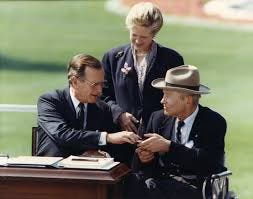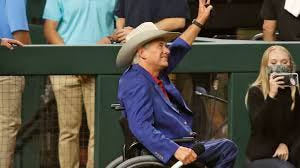How MAGA Scrambled Disability Politics
And: a feel-bad take on a feel-good blindness doc; reading and listening recommendations; (not much) more!
Introducing the Next Generation of White Republican Dudes in Wheelchairs Wearing Cowboy Hats
I have a new essay on the array of threats that the MAGA movement has aimed at disabled people]. I tried to connect the dots between the rhetoric -- the Musk-led pile-on against a blind government watchdog; Trump's false and damaging scapegoating of "DEI hires with intellectual disabilities" for the DC plane crash -- and the more material threats on the horizon, from huge cuts to Medicaid and the Department of Education's Office of Civil Rights to a lawsuit that threatens to roll disability rights back to before the Nixon administration. The piece also allowed me to think through the way the conservative movement's relationship with disability has changed: how did we get from George HW Bush, flanked by two conservative Republicans in wheelchairs, signing the ADA on the White House lawn in 1990, to Texas Gov. Greg Abbott, another conservative white dude in a wheelchair, whose policy positions on disability (alongside many of the rest of his MAGA colleagues) explicitly undermine the protections of the ADA?
Hope you'll give the story a read, it's at Truthdig here.
Travel + Leisure + The Well-Intentioned Ableism of Parents

I also have a story in the new issue of Travel + Leisure, the "Access Issue," with 90s heartthrob (wait can women be 'heartthrobs'? All the female equivalents of heartthrob sound wrong. 'sexy screen lady'?) and 2020s disability advocate Selma Blair on the cover. My story is about the new National Geographic documentary Blink, made by the filmmaking team behind the Oscar-winning doc about Navalny, the Russian opposition leader who died in an Arctic prison camp last year. Blink is ostensibly more heartwarming fare, about a family who, when they learn that three of their four children have RP, an incurable retinal disease that leads to blindness, drop everything and travel around the world to "fill their eyes" (the title of their mother's coffee-table book about the experience) before they go blind. The film manages to end on a note (finally dispensing with the blindness-as-death-sentence vibe and getting the kids actual blindness training) that prevented me from hurling my laptop out the window, but just barely. The Travel + Leisure piece gave me a chance to speak with people I think the documentary -- and the family -- would have done well to seek out, namely blind people for whom travel remains a vital source of delight and adventure regardless of how much vision they do or don't have. I'm glad I wrote it because I frequently get DMs from readers of my book with degenerative retinal diseases (reader, I have one too) who say things like "I want to [travel/read/work/whatever] before my vision goes away" and I appreciate the sentiment but always want to say yo you will still be able to enjoy travel after whatever visual apocalypse you're dreading arrives, don't take my word for it, check out Mona Minkara et al!
Read the piece in Travel + Leisure here.
Recommendation Corner
In order to make this Substack more than just me sending links to things I've written, it's time for Recommendation Corner, the regular feature that all substacks lazily engage in where the author copy-pastes notes from their media diet into the doc.
Slow Listening: Signal Hill
I used to make a podcast for KCRW and McSweeney's called the Organist that was self-consciously "experimental." Making it demanded that I keep up with the world of creative audio, through attending conferences like Third Coast and listening to lots of British productions, like the BBC’s Short Cuts (RIP) or Ross Sutherland's brilliant Imaginary Advice -- the Brits have a much longer and stronger tradition of experimental audio than we Americans do. (Though of course we have our own weird radio-doc lineage, too, from Rumble Strip to Richard’s Famous Food Podcast; back in 2018 I thought about this stuff a lot more.)
After I put the Organist into its cryogenic chamber, I gradually stopped keeping up with weird audio, and my listening diet has slowly become dominated by the intellectual structural-analysis chat-show form: Ezra Klein, Death Panel, et al. Becoming a screen-reader-user over the last few years has increased my tolerance for aural speed-reading by a lot, and I often leave things running at 2x.
When Organist alum Liza Yeager sent me the link to her new audio journal, Signal Hill, I knew that she and her collaborators had put a tremendous amount of care into the audio, and I forced myself to lower the throttle back down to 1x. I'm so glad I did -- the collection of documentaries in Signal Hill’s first issue require patience and open ears, and reward slow listening. There are wandering, politically engaged, aleatoric documentaries like Hannah Sassoon's "A Porous Place", which does the magical documentary thing of building up a sonic context where by the end, the extended vérité tape of sheep bleating as they're herded feels at once intimately specific (like, we know those sheep, and the people herding them, and their long intertwined histories) and simultaneously suggestive, symbolic (knowing by the end what we do about that Southern French land's connection to colonialism, resistance, etc). Highly worth a listen -- I also especially loved Annie Rosenthal's "Caterpillar Roadshow," which felt like a wormhole (caterpillar-hole?) that tore open in an old episode of Radiolab, burrowing away from that show's conventions toward a strange, beautiful, brilliant new terrain. A very moving and funny and smart doc that elegantly weaves together science, history, and family in genuinely surprising ways. And the Connor Gilles piece on Robin D.G. Kelley's oral histories of 1930s black communists in the rural South is a twofer: fascinating/enlivening/timely social-justice history lesson and masterclass on the art (and value) of oral history itself.
(A note to screen-reader users: Signal Hill is great but damn its website needs some love on the accessibility front. For now, I recommend listening on the podcatcher of your choice like Overcast or Spotify or whatever.)
Reading: Fredrik deBoer
In my MAGA disability story, I quote (and briefly dispute) Freddie deBoer's substack on accommodations vs. vibes. To echo the blurbs on his forthcoming novel, I don't always agree with him, but he is a persistently brilliant and entertaining writer who I often benefit from disagreeing with. In that piece on accommodations, and another recent piece on the R-word, I basically agree with deBoer's premise -- that the left often mistakes vibes and performative identity-based outrage for material systemic change that is where our actual focus needs to be if we want to rebuild a successful/powerful progressive coalition -- but (and I think this is where his professional polemicist role takes over) to support that argument, he ends up taking this aggressively snarky "sorry/not sorry" received-wisdom-puncturing stance that loses me. I see his point that "in practice," the R-word "is a normie word that does not imply a particular political project": A few months ago, for instance, I was drinking whiskey with a very smart blind dude who casually dropped the word to describe some ableist assholes. He caught himself, and apologized, in a tentative way that I thought expressed an uncertainty about how PC/woke/cancel-hungry I was (it was the first time we'd met). I agree with deBoer that this guy's use of the R-word doesn't mean that he's officially and immediately part of an alt-right vanguard political niche, but instead grew out of an unexamined middle-school tendency he (and, apparently, deBoer) haven't outgrown.
But I also think deBoer underplays the actual damage the word does; it's too easy for him to casually dismiss it as a boys-will-be-boys slur that has no analogy with the N-word. I think of Eli Clare's riff on euphemism in Exile and Pride (2009). "I scoff at handicapped," Clare writes,
a word I grew up believing my parents had invented specifically to describe me, my parents who were deeply ashamed of my cerebral palsy and desperately wanted to find a cure. I use the word disabled as an adjective to name what this ableist world does to us crips and gimps. Cripple makes me flinch; it too often accompanied the sticks and stones on my grade school playground, but I love crip humor, the audacity of turning cripple into a word of pride. Gimp sings a friendly song, full of irony and understanding. Retard on the other hand draws blood every time, a sharp, sharp knife.
I'd guess that deBoer has never been called that word based on his disability, as Clare and so many others have. (I haven’t, either.) But what does he gain from arguing against the sharpness of that knife, beyond another point to score about progressive identity-politics excess? I think he's sincere in his claim that he's not looking for "some crass and clumsy rejection of everything that social justice is about," but instead wants to foster "a period of frank and at-times uncomfortable conversations that get really specific about how social justice language and norms alienated potential allies and hamstrung Democrats in elections." I agree that those conversations need to be uncomfortable, and that some liberal pieties will get tread upon in the process. But I also think deBoer is too eager to dunk on liberal pieties, and as a result he underplays the way that what he calls "vibes" or "feelings" -- the experience of stigma and harm (a word that surely triggers his aversion to "performative righteousness") are explicitly connected to the hard-nosed real-world material accommodations and policies he thinks we should be focusing on. Even in a recalibration of the left's strategy with regard to identity politics, I think we should still be aware of -- and, god forbid, sensitive to -- the way that discrimination and stigma feels.
Receipts
Thanks to Lainey Feingold, who's not quoted in my Truthdig piece but whose writings (and our conversations) on this subject are extremely lucid and helpful.
Thanks for reading.





I think often about the r-word and also the s-word (spazz) — both descriptions that were casually applied to me in my middle school days. I think that the insult-power of the r word is its association with intellectual disability, which remains highly stigmatized.
Our society equates people’s value with their intelligence. I hope that the fact that computers are getting “smarter” will undermine this tendency. But I fear that the pressure to keep up — to be sharp, to be optimized — is causing people to see intellectual disability as a kind of existential threat.
There’s an eerie tension in the modern world: the more we idolize intelligence, the more we dehumanize those who don’t conform to narrow definitions of it.
Thank you for calling out the threat to Medicaid in your Substack and Truthdig articles. I'm really concerned about what will happen to Medicaid waivers for in-home care of medically fragile children. Over a period of years Oregon (my state) has been slowly terminally starving its only skilled pediatric nursing home in favor of in-home care paid for by Medicaid waivers. If Trump yanks the waivers these parents will be left with no in-home care and no suitable nursing home alternative. Caring for medically fragile children is not like caring for elderly adults so adult nursing homes are not appropriate placements. Parents of these kids will simply be up shit creek. I really doubt Oregon will back fill the money to continue in-home care or force the Sisters of Providence to resurrect their once stellar pediatric nursing home. The same ugly situation is likely to play out in other states too. I plan to go to my state senator's town hall in April with some pointed questions but I'm not expecting to hear anything hopeful.
Yeah, Freddie de Boer really blew it when he tried to defend stigma as more or less benign. He's a really interesting writer and generally worth the $5 or whatever I pay a month but sometimes his essays leave a bad taste in my mouth.
I'm another member of the Ezra Klein fan club. Maybe you can convince him to bring you on his podcast to talk about disability and politics?
I really enjoyed your post and plan to check out Signal Hill. Thank you.